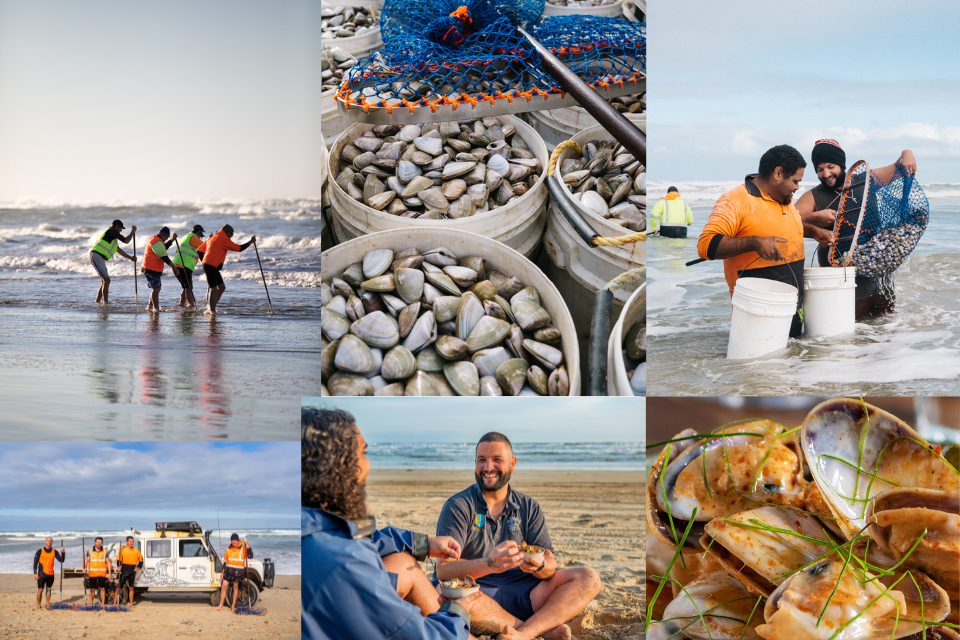Goolwa PipiCo harvests live clams – called ‘pipis’ – in pristine coastal waters off South Australia. The company is part-owned by the Traditional Owners of the land, the Ngarrindjeri people. Pipis have been a staple part of the Ngarrindjeri diet for over a millennia.
In early 2025, Goolwa PipiCo began exporting local clams to markets in Europe. This builds on a steadily growing export business to Asia and the Middle East.
‘We are building the world’s most sustainable fishery,’ says Sam Jeffries, Sales and Marketing Manager, Goolwa PipiCo. ‘Clams have been harvested from the cold, clear surf beach of the Coorong National Park for around 19,000 years. Now we are taking them to the world.’
Indigenous seafood culture
Goolwa PipiCo is a wild fishery, based in South Australia. It specialises in a specific species of clam, or bivalve mollusc. Known locally as ‘pipis’, the clams are smooth and wedge-shaped with a chalky white shell.
The company’s 8-strong crew hand-harvests around 450 tonnes of pipis per year. Goolwa PipiCo sells its products in different formats through fishmongers and supermarkets throughout Australia.
‘The pipi fishery is difficult to access, and our crews have to cross remote sandhills to reach our harvesting beach,’ says Jeffries. ‘This means harvesting is logistically hard work. But it also means we harvest our clams in totally pristine surf waters.’
The business is part-owned by a First Nations enterprise, KutiCo. This means traditional landowners have a direct interest in a premium seafood business.
‘We harvest some of the finest clams in the world,’ says Jeffries. ‘While many fisheries mechanically vacuum the seabed, our hand-harvest quota system means that we touch every pipi we catch. This means that we can see even the smallest variances in our natural resources every time we go to work.’
Australian seafood in global markets
During 2024, Goolwa PipiCo invested in new clam de-sanding equipment at its state-of-the-art facility in Port Elliot, South Australia. This results in pipis that are grit-free.
Meanwhile, new packaging technology increases export potential. Goolwa PipiCo can dispatch clams in modified atmosphere trays. This means the clams are alive, but dormant. The 10-day shelf life makes it feasible to export live clams to other countries.
Alternatively, Goolwa Pipi can blast-freeze the clams. This gives the clams a 2-year shelf life, while locking in the flavour of just-caught seafood.
New packaging capabilities make Goolwa PipiCo unique. It is the only export-approved facility for pipis in Australia.
‘These washing and packaging investments give us a world-class product,’ says Jeffries. ‘We have recently gained new accreditation from the Department of Agriculture, Fisheries and Forestry.
‘In 2025 we set out to sell in global markets.’

Goolwa PipiCo's pipis are harvested by hand in pristine coastal waters off South Australia.
Austrade opens new export markets
Goolwa PipiCo selected Spain and Italy as its first target markets in Europe. Jeffries has opted to work with Austrade to promote the Goolwa PipiCo brand in these countries via trade shows.
‘We will be part of the Seafood Global Expo in Barcelona in May 2025,’ he says. ‘Austrade has facilitated a stand that will showcase our product in the best way possible.’
The Australia stand will include a Spanish-Australian chef who will prepare seafood from 11 producers. The chef will organise bespoke tastings for potential customers from across Europe, North America and Asia.
‘The seafood stand is a significant marketing tool for Australian seafood,’ says Jeffries. ‘We couldn’t hope to organise these tastings by ourselves. By working with multiple Australian seafood exporters, Austrade can create a whole experience for potential buyers.’
Middle East expansion
Goolwa PipiCo is also expanding to the Middle East and Asia.
‘Goolwa PipiCo recently attended Dubai’s Gulfood trade show in March 2025,’ says Jeffries. ‘The stand was a combined effort from Trade and Investment, South Australia, and from Austrade.
‘We were unbelievably well-supported at the event. The local Austrade representative introduced us to a number of potential customers. We would not have met them without Austrade connections.’
Global prospect for small seafood exporters
Jeffries says Australia has a great story to tell on pristine fisheries. He is confident of global success for Goolwa PipiCo and other Australian seafood.
‘We are now flying fresh seafood to Asia, and we may also look at China,’ he says. ‘The Chinese diaspora in Sydney is our biggest domestic market. We are also exporting to Hong Kong and Singapore.’
‘There is a global market for premium seafood fished from the cool, clear, southern oceans,’ says Manuel Barbera, Austrade’s Business Development Director in Spain. ‘Small exporters are casting their nets in global markets, and we can help them flourish.’
Contact Manuel Barbera to explore opportunities to export Australian seafood to Spain.
Go further, faster with Austrade
Austrade’s Go Global Toolkit helps you learn the export basics, find the right markets and understand market requirements.